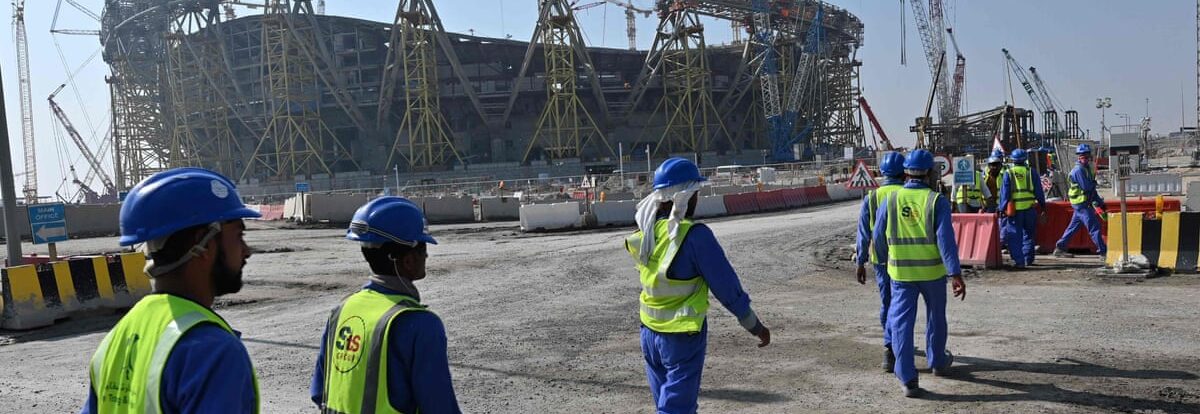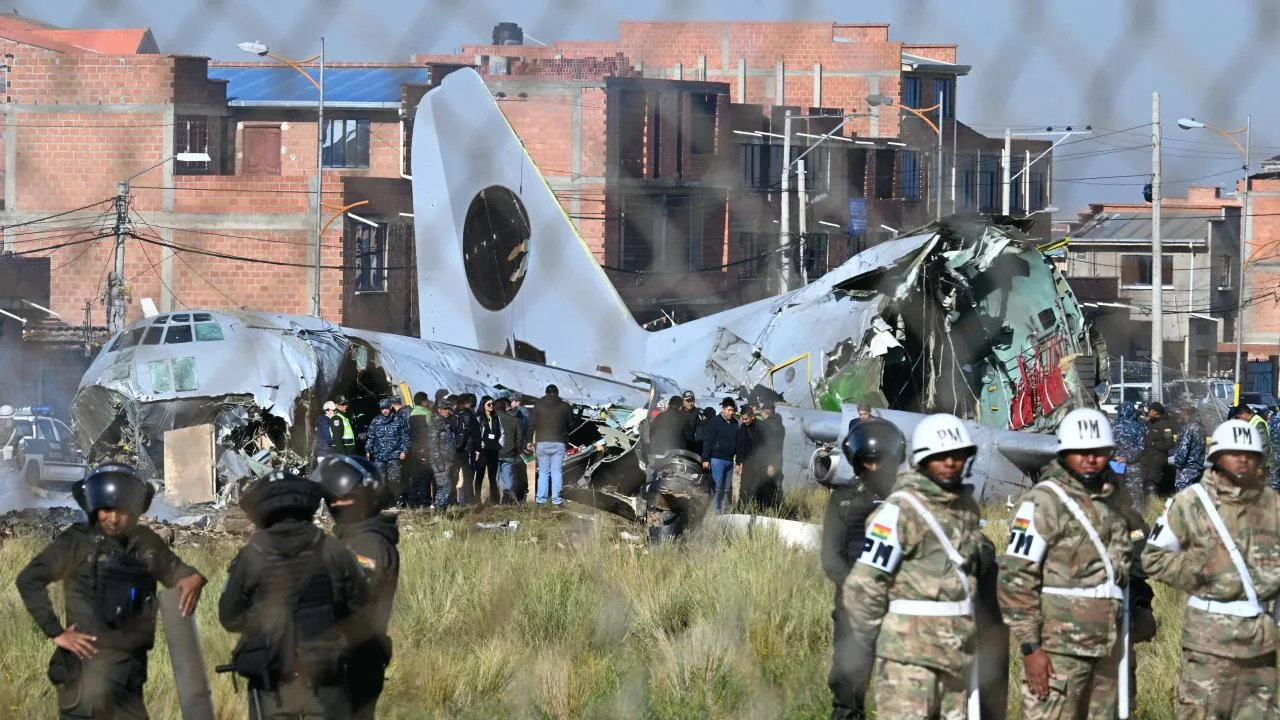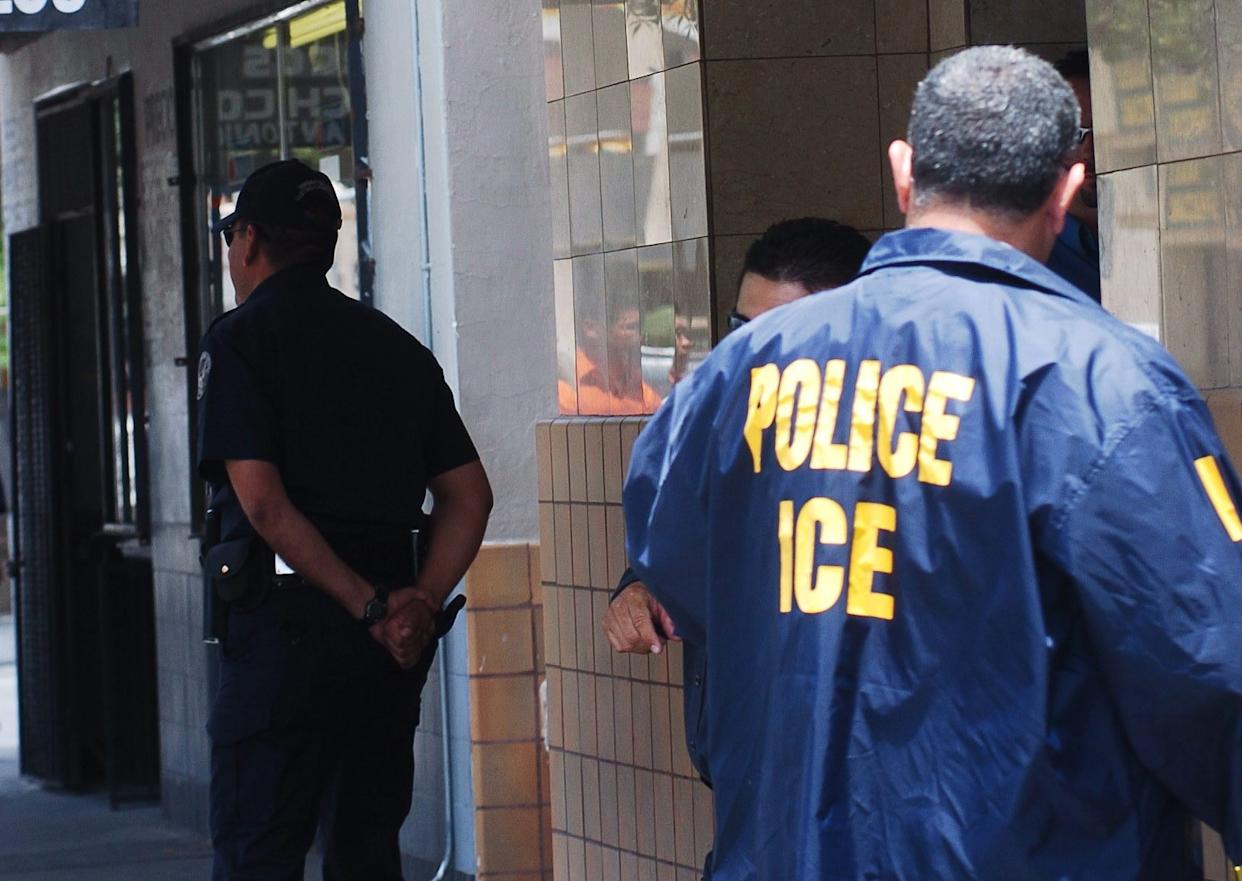International
Year before Qatar World Cup, Amnesty urges end to labour abuses

AFP
A year before the World Cup in Qatar, Amnesty International Tuesday urged the energy-rich emirate to end abuses against migrant workers, many of whom built the tournament’s infrastructure.
“The daily reality for many migrant workers in the country remains harsh, despite legal changes introduced since 2017,” the London-based human rights group said.
It urged Qatar to abolish the so-called kafala sponsorship system which bonds foreign labourers to employers, making them more vulnerable to abuses such as late- and non-payment of wages.
“Apparent complacency by the authorities is leaving thousands of workers at continued risk of exploitation by unscrupulous employers, with many unable to change jobs and facing wage theft,” said Mark Dummett, Amnesty’s global issues programme director.
“They have little hope of remedy, compensation or justice. After the World Cup, the fate of the workers who remain in Qatar will be even more uncertain.”
Amnesty also said “authorities have done little to investigate the scale of unexplained deaths” arguing there was evidence of links to unsafe working conditions.
It charged that foreign labourers have scarce access to justice and are banned from organising to fight for their rights.
Qatar has previously faced criticism for its treatment of migrant workers, with campaigners accusing employers of exploitation and forcing labourers to work in dangerous conditions.
– ‘Work in progress’ –
Qatar authorities insist they have done more than any country in the region to improve worker welfare, and reject international media reports about thousands of migrant workers’ deaths.
“Qatar rejects Amnesty’s assertion that labour reforms have not translated into changes on the ground for hundreds of thousands of migrant workers,” its Government Communications Office said in a statement.
More than 240,000 workers had successfully changed jobs since barriers were removed in September 2020, and more than 400,000 had directly benefited from a new minimum wage, it said.
Qatar pointed to other reforms, including new visa centres in countries of origin, that had “significantly reduced exploitative practices”, and an extended ban on summer working “to minimise the effects of heat stress”.
“Qatar has never shied away from acknowledging that its labour system is still a work in progress,” it added.
Amnesty acknowledged that Qatar had made positive reforms since 2017, also including limits on working hours for live-in domestic workers, labour tribunals and a fund to support payment of unpaid wages.
But the rights group charged that “a failure to implement” some of the reforms “means exploitation continues”.
“Qatar is one of the richest countries in the world, but its economy depends on the two million migrant workers who live there,” Dummet said.
“By sending a clear signal that labour abuses will not be tolerated, penalising employers who break laws and protecting workers’ rights, Qatar can give us a tournament that we can all celebrate. But this is yet to be achieved.”
International
Bolivia Orders Three Investigations Into Deadly Military Plane Crash

Bolivia’s Defense Minister Marcelo Salinas announced Monday that three separate investigations will be conducted into Friday’s crash of a military cargo aircraft at El Alto International Airport, near La Paz, which left at least 22 people dead.
The Hercules aircraft, operated by the Fuerza Aérea Boliviana (FAB), was transporting cash intended for the Central Bank of Bolivia when it overshot the runway after landing from the city of Santa Cruz. The plane reportedly traveled nearly one kilometer beyond the airport perimeter.
The incident sparked chaotic scenes, with individuals attempting to collect scattered banknotes. Authorities detained 51 people in the aftermath, and the government declared three days of national mourning.
Multiple Investigations Underway
The first inquiry is being led by a military board from the Bolivian Air Force, which has already taken custody of the aircraft’s black box for analysis.
Minister Salinas said two additional investigations will follow — one conducted by the insurance company and another by the aircraft’s manufacturer.
“At least two more investigations will come, that of the insurance company and that of the aircraft manufacturer,” Salinas said during a press conference in Santa Cruz.
He cautioned that the investigative process could take between three and six months, noting that the black box cannot be opened in Bolivia due to the lack of specialized laboratories for analysis.
Awaiting Official Findings
Salinas stressed that the FAB investigative board is the highest authority in the case and urged the public to wait for its conclusions to avoid speculation about the causes of the crash.
He also confirmed that the government has contacted the families of the 22 victims and the 37 injured, as well as the owners of 15 damaged vehicles, to coordinate procedures with the insurer and cover the corresponding expenses.
International
Mexico Calls for Immediate Probe After National Dies in ICE Custody

Mexico’s Secretaría de Relaciones Exteriores (SRE) on Monday called on U.S. authorities to conduct an “immediate and thorough” investigation into the death of a Mexican national while in custody of U.S. Immigration and Customs Enforcement (ICE) at a processing facility in California.
In a statement, the Mexican government described the death as “regrettable” and urged U.S. officials to clarify the circumstances surrounding the case in order to “determine responsibilities and ensure that such events do not happen again.”
Death at Adelanto Processing Center
According to available information, the Mexican citizen died at the Adelanto Processing Center in California while under ICE custody. Authorities have not yet released the individual’s identity or the cause of death.
Following the incident, Mexico’s Foreign Ministry formally requested “detailed information” from U.S. authorities, including the detainee’s medical records and custody reports.
Consular Assistance Activated
The Mexican Consulate in San Bernardino, California, has activated consular assistance protocols to provide ongoing support to the deceased’s family. Officials have contacted relatives to express condolences and offer legal guidance, as well as assistance with the necessary procedures to repatriate the remains.
“The handling of situations like this and the establishment of mechanisms to resolve them are priorities for the Government of Mexico,” the Foreign Ministry said, adding that it will formally request an investigation into any systemic conditions that may have contributed to such incidents.
Local Mexican media reported that seven Mexican nationals died while in ICE detention last year — the highest number recorded since the agency was created.
International
Anti-ICE Billboard Campaign Targets Immigration Spending in 31 U.S. Cities

More than 200 billboards criticizing U.S. Immigration and Customs Enforcement (ICE) began appearing Monday in 31 cities across the United States, including Miami, as part of a campaign highlighting the high cost of immigration enforcement operations for taxpayers.
The initiative, titled “ICE Costs Us,” was launched by the civil rights organization Mijente and will run for four weeks.
Criticism of Spending and Enforcement Tactics
The billboards feature images of ICE agents during arrests or carrying military-style weapons. According to the organization, spending on military-grade equipment for the agency has increased by 600 percent in recent years.
Several signs display messages such as:
“Your taxes are being wasted” and “ICE’s cruelty costs you $28 billion,” referring to the agency’s annual budget.
In a statement, Marisa Franco, co-founder of the Mijente Support Committee, said:
“For too long, our government has prioritized building cages and investing billions in an immigration enforcement apparatus that has left families torn apart and communities terrified.”
She added that “Millions of Americans are living paycheck to paycheck, yet this violent agency continues operating with a blank check. These decisions do not make us safer nor improve our economic security. Our billboards highlight these choices and demand a different path.”
Budget Debate and Medicaid Comparison
The campaign also draws a comparison between ICE’s funding and the estimated 17 million people who could lose health coverage under Medicaid due to federal budget cuts under President Donald Trump.
Other billboard messages seen in various cities include:
“They get billions to beat us; we get layoffs and rising rents” and “Funding ICE is a fast track to fascism.”
Organizers say the goal is to spark public debate about the allocation of federal funds for immigration enforcement and the broader economic and social impact of such policies on communities nationwide.
-

 International2 days ago
International2 days agoIran Reports 201 Dead, 747 Injured After U.S. and Israeli Strikes
-

 International5 days ago
International5 days agoCocaine Production Surges 34% in 2023 as Market Expands into Africa and Asia
-

 International4 days ago
International4 days agoTrump Floats “Friendly Takeover” of Cuba Amid Rising Tensions
-

 International2 days ago
International2 days agoPope Leo XIV Urges End to ‘Spiral of Violence’ in Middle East
-

 Sin categoría3 days ago
Sin categoría3 days agoTrump: ‘We Think It’s True’ Amid Claims Iran’s Supreme Leader Was Killed
-

 International3 days ago
International3 days agoSecurity Council to Hold Emergency Meeting on Middle East Crisis
-

 International20 hours ago
International20 hours agoBrazil’s Supreme Court Rejects Bolsonaro’s Bid for House Arrest
-

 International5 days ago
International5 days agoFederal Judge Blocks Trump Policy Allowing Deportations to Third Countries
-

 International4 days ago
International4 days agoArgentina’s Senate Reviews Milei-Backed Labor Overhaul
-

 International20 hours ago
International20 hours agoAnti-ICE Billboard Campaign Targets Immigration Spending in 31 U.S. Cities
-

 International5 days ago
International5 days agoClinton Accuses Republican Committee of Using Epstein Case to Shield Trump
-

 International20 hours ago
International20 hours agoTrump Warns of ‘Major Wave’ of Attacks as Iran Conflict Escalates
-

 International20 hours ago
International20 hours agoMexico Calls for Immediate Probe After National Dies in ICE Custody
-

 Central America20 hours ago
Central America20 hours agoPanama Canal Monitoring Trade as Middle East Conflict Disrupts Shipping
-

 International20 hours ago
International20 hours agoBolivia Orders Three Investigations Into Deadly Military Plane Crash




























